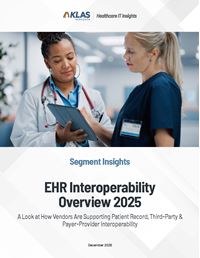 2026 BEST IN KLAS
2026 BEST IN KLAS
Preferences
Related Series


Interoperability 2017
First Look at Trending—Some Progress Toward a Distant Horizon
In a single day, KLAS heard the same message expressed by a gathering of industry interoperability experts as well as shared in a tweet by Intermountain Healthcare CIO Marc Probst. The message? The industry needs to stop talking about HIT interoperability and actually do it. Trending information from US healthcare organizations provided for the first time in this report suggests that they are right; progress has been way too slow and simply not enough.
1. Despite Growth, Interoperability Has a Long Way to Go; athenahealth and Epic Lead in Different Ways
First, the good news. Over the last year, the interoperability efforts of provider organizations and vendors have matured. The percentage of healthcare organizations reporting “deep interoperability” when sharing data with disparate EMRs has more than doubled, from 6% in 2016 to 14% today. Now the bad news: the remaining 86% have yet to achieve this success. Even the most successful customer base, that of athenahealth, sits at only 23%. When sharing with organizations using the same EMR, Epic customers are easily the most advanced, with 51% reaching deep interoperability. In general, regardless of vendor, organizations sharing data with others using the same EMR maintain a head start; 26% have achieved deep interoperability—up 2% from last year.

2. athenahealth and Cerner Clients Have Most Consistent Access to Outside Data from Different EMRs; Led by NextGen Customers, Most Vendors’ Clients See Significant Growth in Connections
Nearly every EMR vendor’s client base saw an increase in the number of organizations that have consistent access to the data they need from organizations that use a different EMR from their own. Some increases have come for non-technology reasons, such as organizations joining existing HIEs, establishing new exchange agreements with competitors, or increasing adoption by clinicians. Vendors have made a difference by providing access to new networks via CommonWell or Carequality (athenahealth, Cerner, Epic), offering multiple sharing options (Allscripts, Cerner), or simplifying interoperability workflows (athenahealth, NextGen Healthcare). Due to cost, a lack of EMR development, and insufficient vendor support, eClinicalWorks and McKesson customers saw the lowest levels of improved access.

3. Impact of Data on ____ Patient Care Stagnates
As providers gain increased access to outside data, they begin to hit a wall in terms of the value of that data. Some customer bases that have been the most successful in gaining access, including those of athenahealth, Epic, and GE Healthcare, are less likely to feel the patient data is consistently helpful than they were in 2016. Time-pressed providers say the overwhelming volume and cumbersome format of shared data—which typically takes the form of CCDs/C-CDAs and static documents—make searching for needed data impractical. In reaction, providers identify insufficient industry standards and poor usability of tools as today’s top barriers to interoperability. Allscripts and NextGen Healthcare customers buck the trend of higher access resulting in low impact; Allscripts customers tout dbMotion’s facilitation of care, and NextGen Healthcare’s clients give a broad range of reasons for the strong impact they achieve.

4. Carequality and CommonWell Slowly Gaining Foothold with athenahealth, Cerner, and Epic Customers
As in previous years, public, private, and vendor-sponsored HIEs continue to be important methods for sharing data. In 2017, two complementary initiatives, CommonWell and Carequality, have brought new energy to the topic. While most EMR vendors have been long-time members of either or both initiatives, this is the first year that a significant number of provider organizations reported being live participants. Epic customers are the dominant Carequality users due to Epic’s concerted efforts to bring them online. athenahealth and Cerner clients make up the majority of respondents who say they are active CommonWell participants. athenahealth’s cloud-based EMR allows customers to be enabled in the background. Other vendors’ clients not yet live report a mixture of hope and skepticism regarding vendors’ claims about these initiatives. Overall, providers see promise and several express hope in the announcement of cooperation between CommonWell and Carequality.

5. Only Epic-to-Epic Sharing Receives High Score for Interoperability Support; eClinicalWorks and McKesson Clients Most Likely to __ Express Dissatisfaction
Customer ratings of vendor support for interoperability remain subpar, though they have increased since 2016. Only one vendor, Epic, received an outstanding score (8.3 out of 9.0) for facilitating the sharing of data between same-EMR customers; when sharing with other EMRs, Epic rates a 6.1. athenahealth has the highest rating (6.4) for sharing with different EMRs and is praised for ease of use. Providers using eClinicalWorks and McKesson give low ratings to their vendors, citing high costs, poor service responsiveness, and lack of progress in filling technology gaps. Consistent with customer opinions, non-customers gave athenahealth and eClinicalWorks the highest and lowest ratings, respectively, for their cooperation in establishing connections.


Designer
Natalie Jamison

Project Manager
Robert Ellis
This material is copyrighted. Any organization gaining unauthorized access to this report will be liable to compensate KLAS for the full retail price. Please see the KLAS DATA USE POLICY for information regarding use of this report. © 2026 KLAS Research, LLC. All Rights Reserved. NOTE: Performance scores may change significantly when including newly interviewed provider organizations, especially when added to a smaller sample size like in emerging markets with a small number of live clients. The findings presented are not meant to be conclusive data for an entire client base.









.jpg?preset=report-cover-two-page-report)

